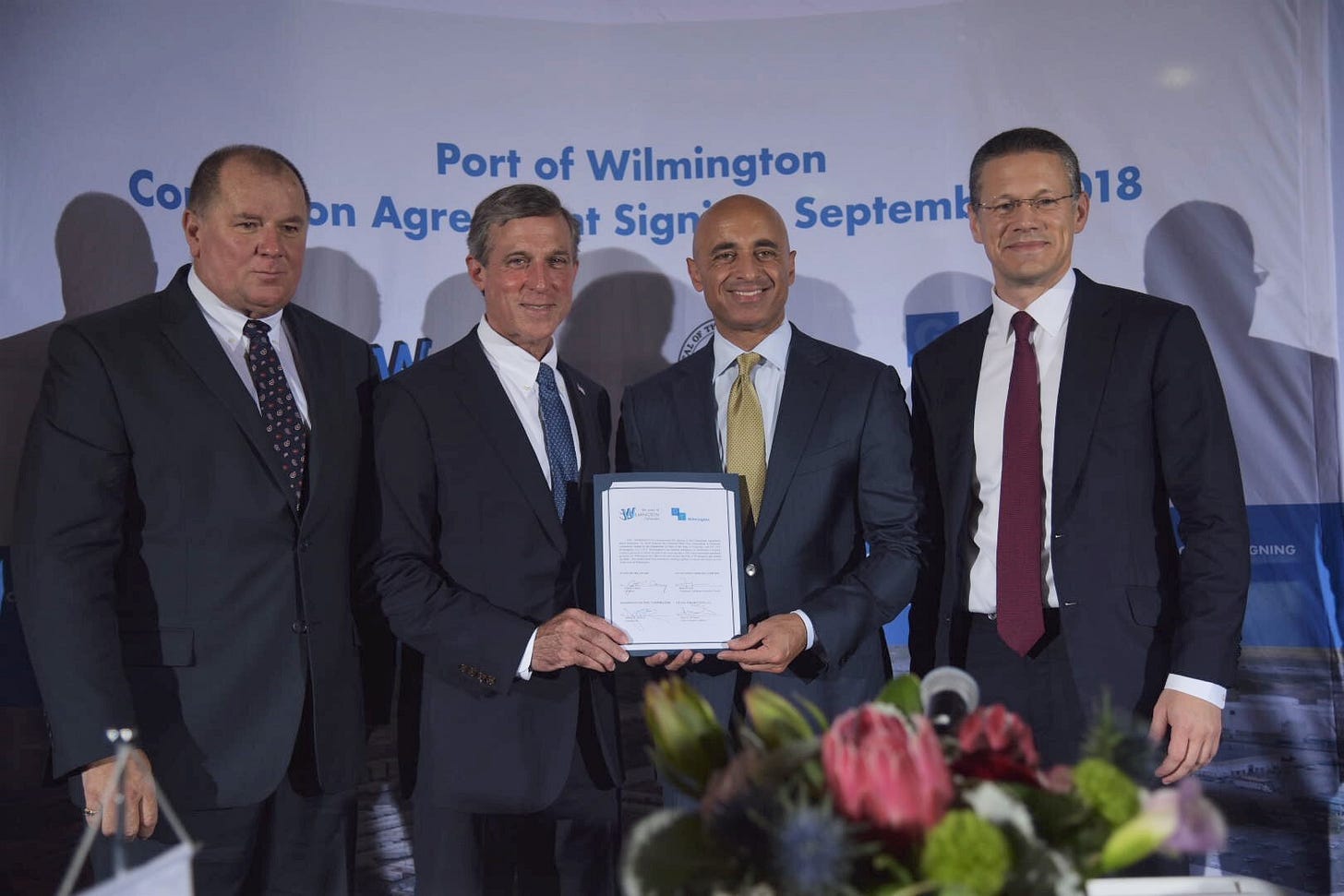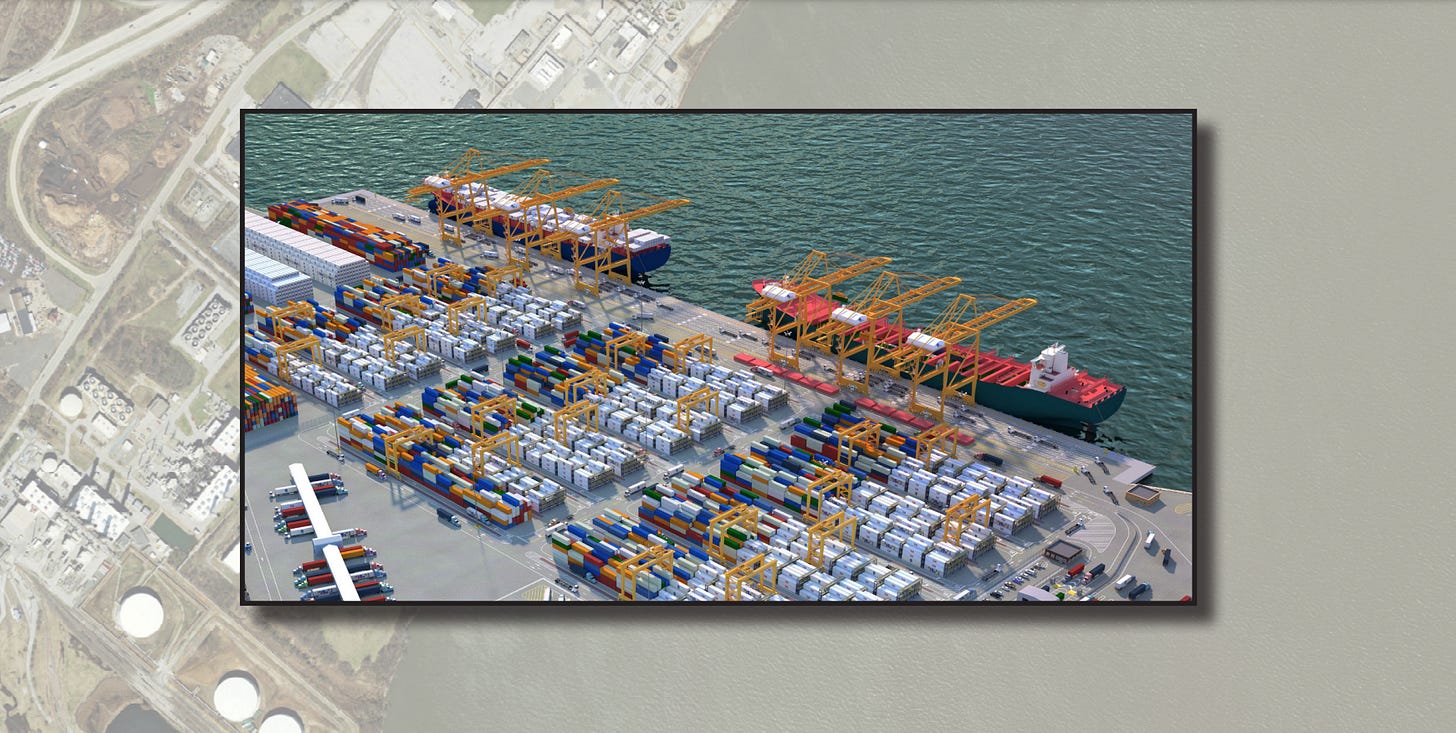Delaware announces new company to take over the Port of Wilmington; internal doc reveals taxpayers to pay $100 million
After years of financial distress, Delaware officials apparently have moved on from Gulftainer.
Delaware port officials chose a Massachusetts shipping company, called Enstructure LLC, to become the next operator of the Port of Wilmington.
And, taxpayers could invest $100 million to help the venture pursue the state’s longstanding goal of building a new container terminal along the Delaware River.
The decision ends a financially tumultuous five years at the port under its current operator, GT USA Wilmington, LLC – a subsidiary of Emirati logistics company, Gulftainer.
The turmoil led to millions of dollars in missed lease payments to the state, and to GT USA’s failure to meet deadlines for construction of the new container terminal — planned for the site of a former DuPont chemical plant, called Edgemoor.
The problems culminated last fall when GT USA Wilmington’s creditors seized control of its board of directors, and by extension control of the Port of Wilmington — one of Delaware’s largest publicly owned assets and an anchor of well-paying, blue-collar jobs in the state.
In recent months, those creditors – led by AIG – searched for a new company to take over the port.
Several companies showed interest, in addition to Enstructure.
They included HMM, a South Korean shipping giant; Liwathon, a little known British oil and gas company; the Holt family, operators of much of the Port of Philadelphia; and even GT USA.
Last month, board members of the Diamond State Port Corporation — a state-owned entity that oversees the port — reviewed the companies’ proposals during a confidential executive session, according to the meeting minutes from the session.
The proposals varied in their details. Liwathon suggested “developing a wind turbine facility at Edgemoor.” GT USA said it was pursuing a partner company to develop Edgemoor as a joint venture.
Still, all of the proposals contained less lucrative terms for the state than the deal Delaware signed with Gulftainer in 2018, establishing its current 50-year lease.
Besides its pursuit of a joint venture, GT USA’s new proposal also sought $100 million from Delaware. That sparked questions from one board member over how the state could fund such an amount, according to the minutes from the executive session meeting.
In response, Secretary of State Jeffrey Bullock, who chairs the Diamond State Port Corporation board, said taxpayers ultimately will have to support Edgemoor construction with at least $100 million, regardless of the company that takes it over, according to the meeting minutes.
He said Gov. John Carney “has already provided half of this amount and we would have to find the other half,” the minutes stated.
In all, the proposals presented a starkly different reality from 2018 when Carney declared that the state’s deal to privatize the port through the lease to Gulftainer would allow it to “get out of the business of subsidizing” the facility.
State officials at the time also predicted that their privatization deal could fend off competing ports, and ultimately double Delaware’s 5,700 maritime jobs.

On Monday, a month after the April meeting, the Diamond State Port Corporation board met again, and passed a resolution naming Enstructure as their choice to take over the Port of Wilmington.
“We’ve landed on Enstructure, which means we have not landed on Gulftainer,” Bullock said.
He described the process as “essentially what we did five years ago” when the state did choose Gulftainer as its partner port.
The difference this time is there has been no fanfare.
“We did not come to this point easily,” Bullock said. “But as they say in sports that’s why you play the game.”
Enstructure – which also owns Port Contractors, a port services company with a presence in and around the Port of Wilmington – now is set to begin negotiating changes to the port’s existing lease.
For its deal to be finalized, the changes must be approved by state legislators and again by the Diamond State Port Corporation.
While Delaware lawmakers nearly always approve such deals, this case could arouse more scrutiny due to the current financial state at the port.
Separately, a group of residents who live near Edgemoor are challenging the state to include community members in any finalized deal. They argue that in the past Delaware has ignored their concerns around potential environmental degradation and truck traffic at a new Edgemoor port.
At Monday’s meeting, Jeffrey Richardson, the leader of one neighborhood advocacy group, pleaded with state officials to include in any deal a promise that the port operator sign a contract with neighbors, called a community benefits agreement, that would enshrine ways in which their concerns could be mitigated.
He also called for the state to hold an open public meeting, in which community members could ask questions of port officials.
“Since we are committed to collaborating and working with you, then work with us,” said Richardson, chair of the Delaware Community Benefits Agreement Coalition.
Enstructure’s proposal to Delaware
While final details of Enstructure’s plan for the port are not yet clear, portions of the company’s initial proposal is summarized in the meeting minutes of the April-21 executive session.
The document shows how Enstructure’s proposal included a $1-million annual lease payment to Delaware – a decrease from the current $3-million minimum payment that GT USA is supposed to pay.
Enstructure also proposed to invest $87 million toward capital improvements at the port, about half of which would come before 2032, according to the April executive session minutes.
“Their plan is to provide $21 million to the port at closing to help fund the furtherance of Edgemoor,” the minutes stated.
Finally, Enstructure’s April proposal noted that it has "access for capital funding through Blackstone,” a massive private equity firm.
It also said the company was negotiating at that time with South Korea’s HMM on a joint venture “to develop the Edgemoor facility.”
It is unclear whether the two companies’ negotiations ended with an agreement.
A spokesman for Enstructure said the company cannot currently comment on any non-public information. As such, it also is unclear whether Enstructure will commit additional money, beyond the $87 million, toward building Edgemoor.
Past estimates for construction of an Edgemoor container terminal have placed the cost at upwards of $400 million.
In an emailed statement, the Enstructure spokesman said the company is “excited” to develop Edgemoor and recognizes “the importance of the Port to the State of Delaware and the local community, as well as the pressing need for strategic investment to position Delaware for the future in the maritime industry.”

The tire controversy
The Diamond State Port Corporation’s Monday meeting also addressed the most visible controversy at the Port of Wilmington during the past year – the use of the Edgemoor property as a site to store a mountain of scrap and used tires.
Last year, Delaware environmental regulators sanctioned GT USA Wilmington and another company, stating that “thousands of scrap tires” were improperly stored at the property as early as December 2021.
After neighbors learned of the sanction, many were outraged, arguing the tires could pose a fire hazard or could become a haven for swarms of mosquitos.
In response, Rep. Debra Heffernan, who sits on the board of the Diamond State Port Corporation and represents neighborhoods near Edgemoor, urged the board to pass a resolution allowing the state to unilaterally remove the tires.
“We have an environmental disaster waiting to happen,” Heffernan said during Monday’s meeting.
The board passed the resolution following her comments.
After the meeting, Bullock said GT USA has “someone to do the work” of removing the tires, and the state will give the company until end of the week “to figure that out before we move forward.”
When asked if the cost to the state of the tire removal could be as much as $3 million. Bullock said yes, “if there’s no value to the tires.”
And, would the state sue if it’s forced to pay the bill?
“I don’t want to use words like that, but yes, do we have an ability to seek recovery of the funds? Absolutely. And would we do that? Absolutely,” Bullock said.
Contact Karl Baker at kbaker6@protonmail.com or on Signal at 206-595-0057.



